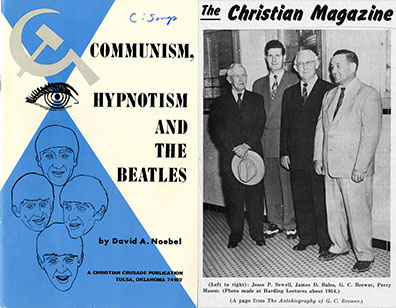Special Collections Awarded Largest Grant in Department's History

(Left) Communism, Hypnotism, and the Beatles, published by Billy James Hargis' Christian Crusade Publications (Tulsa, Oklahoma), 1965, argues that the "anti-Christ Beatles" use rock-and-roll music to destroy America. (Right) The Christian Magazine was a non-denominational, non-profit organization based in Murfreesboro, Tennessee. James D. Bales appears (second from the left) on the cover of this issue from December 1956.
FAYETTEVILLE, Ark. – The University of Arkansas Libraries Special Collections Department has been awarded a $73,989 grant from the National Historical Publications and Records Commission to process the James D. Bales papers.
Bales taught at Harding College in Searcy from 1944-1981 and became nationally known for his conservative political activism and his anticommunist stance.
This is the largest grant Special Collections has received and the second largest National Historical Publications and Records Commission grant to be awarded to the state of Arkansas.
Bales’s papers span 435 linear feet and include biographical documents, scrapbooks, correspondence, speeches, lectures, teaching materials, unpublished manuscripts, and a range of research files.
The Bales papers document the development of the modern conservative movement and include a wide range of research materials on the civil rights movement, with information on a variety of African American organizations and leaders throughout the 1950s and the 1960s.
Once processed, the Bales Papers will support emerging studies by a range of national and international researchers on Cold War politics, the civil rights movement, and educational reform, as well as a host of topics relating to the development of U.S. cultural, economic and political policies.
“Taken as a whole, the Bales papers illustrate an elaborate labyrinth of radical conservative organizations, highlighting how these organizations and leaders were networked through print and radio outlets,” said Angela Fritz, interim head of Special Collections. “By presenting the distinct print subcultures of the U.S. political right as ‘movement literature,’ the Bales papers illuminate the complexities of political activism of the 1950s and the 1960s and provide an important supplement to publications from left-leaning political groups, in turn, presenting a more complete record of dissonant voices and opinions of the time.”
Complementary holdings in Special Collections include the papers of Billy James Hargis, founder of the Christian Crusade Against Communism; the papers of Commonwealth College, a labor school operating in Mena from 1923 to 1940; the papers of William Gilbert, a socialist activist and community leader of the 1920s and the 1930s; a collection of pamphlets, leaflets and other materials published and distributed by the Citizens’ Councils of America from 1947 to 1969; the Orval Faubus papers; and the J. William Fulbright papers, documenting the career of one of Bales’ perennial targets.
“The Libraries are committed to processing, promoting and making freely available materials documenting the social context of the state and region. The Bales collection will greatly expand access to information on a multifaceted movement that still affects political discourse and social programs in the state of Arkansas today,” said Carolyn Henderson Allen, dean of libraries. “We are proud to be awarded funding to process Bales’ papers, and I have no doubt the collection will be utilized immediately.”
“Seeing Red: James D. Bales and the Southern Red Scare” was one of seven grants awarded by the National Historical Publications and Records Commission this year as part of its “Access to Historical Records” grant program, supporting archival repositories in preserving and processing primary source materials that encourage understanding of democracy, history, and culture.
The National Historical Publications and Records Commission, a statutory body affiliated with the National Archives and Records Administration, supports a wide range of activities to preserve, publish, and encourage the use of documentary sources, created in every medium ranging from quill pen to computer, relating to the history of the United States. For additional information, visit www.archives.gov/nhprc.
About the University Libraries: Located at the heart of campus, David W. Mullins Library is the university’s main research library. Branch libraries include the Robert A. and Vivian Young Law Library, the Fine Arts Library, the Physics Library, and the Chemistry and Biochemistry Library. The Libraries provide access to more than 2 million volumes and 53,000 journals, and offer individual and group research help, study spaces, computer labs with printing and scanning, interlibrary loan and delivery services, and cultural exhibits and events. The Libraries’ Special Collections Department acquires, preserves, and provides access to materials on Arkansas and the region, its customs and people, and its cultural, physical, and political climate. Visit the Libraries’ web page at libraries.uark.edu to learn more about services and collections.
About the University of Arkansas: The University of Arkansas provides an internationally competitive education for undergraduate and graduate students in more than 200 academic programs. The university contributes new knowledge, economic development, basic and applied research, and creative activity while also providing service to academic and professional disciplines. The Carnegie Foundation classifies the University of Arkansas among only 2 percent of universities in America that have the highest level of research activity. U.S. News & World Report ranks the University of Arkansas among its top American public research universities. Founded in 1871, the University of Arkansas comprises 10 colleges and schools and maintains a low student-to-faculty ratio that promotes personal attention and close mentoring.
Contacts
Angela Fritz, interim head, Special Collections
University Libraries
479-575-5576, fritz@uark.edu